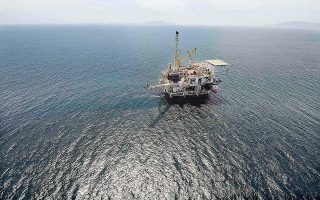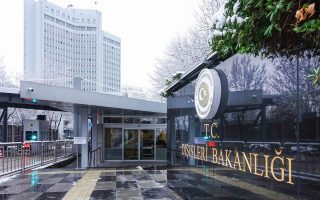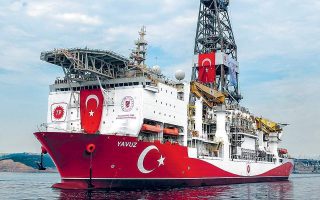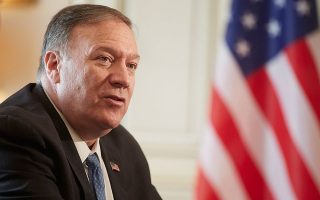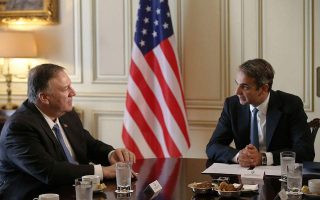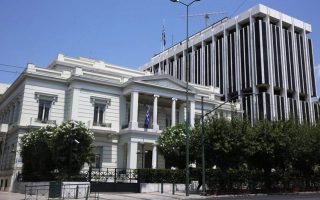Turkish ambassador: Drillships to remain in Cyprus until resources are shared
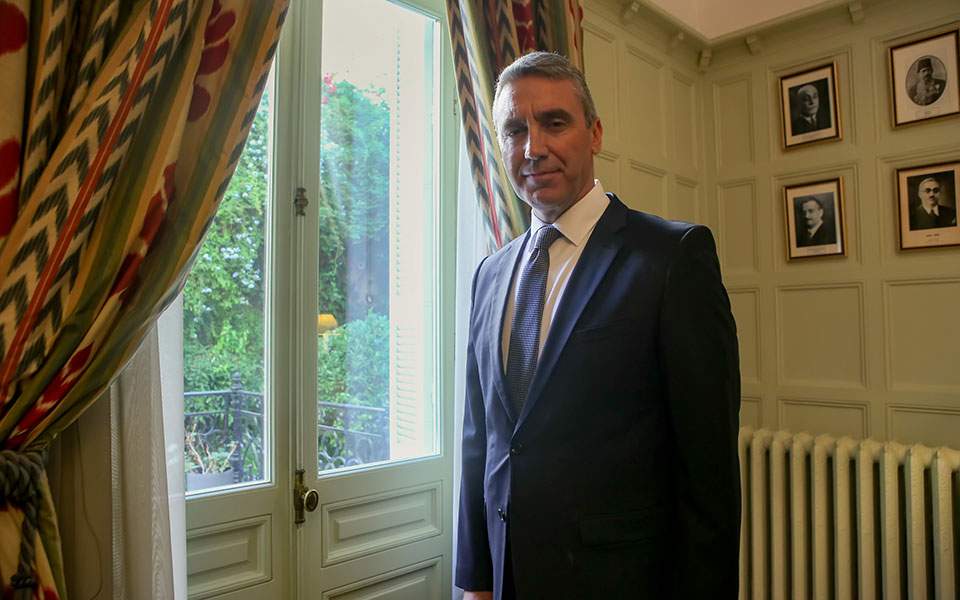
Turkey's drillships and seismic research vessels will not leave Cypriot waters unless Nicosia includes Turkish Cypriots in its decision-making concerning hydrocarbon exploration, the country's ambassador to Greece said in an interview with Kathimerini.
Burak Ozugergin claimed that the drillships Fatih and Yavuz are in fact in Turkey's continental shelf and not Cyprus', adding that the “final maritime boundaries” cannot be settled for the island-state without a “political settlement.”
The ambassador did not deny that Turkey is discussing the delimitation of an exclusive economic zone with Libya.
Concerning Syria, Ozugergin rejected accusations that Turkey wants to change borders or the demographics of the region, arguing that its aim is to “enforce Syria’s territorial integrity.”
As for his country's relations with Greece, he said Turkey is not a revisionist country and that it respects the Lausanne Treaty and its neighbors borders, contrary to what the Greek public is being told.
What will Turkey's next steps be on the Syrian front?
Put simply, we want peace and stability in Syria. This may sound like a cliche, but having almost a 1,000-kilometer-long land border with a country which faced nearly a decade of destruction and human tragedy makes you especially sensitive to your neighbor’s plight. Things are looking up, though, as within the space of a week we reached essential agreements with both the United States and the Russian Federation. Both countries formally acknowledged our legitimate security concerns. Our aim is to protect our own national security against terrorist threats, while at the same time ensuring Syria’s territorial integrity. Make no mistake: We will not tolerate terrorism either within our country, or at our doorstep, be it DAESH, PKK or its affiliate PYD/YPG. We will not allow separatist agendas in Syria either. A safe zone will be established from the Euphrates River until the border with Iraq; terrorist elements and their fortifications will be cleared and the area will be appropriately monitored. But military action is only a part of the equation. We have also been actively involved in finding a lasting political solution to the Syrian conflict for years now. In fact, Turkey is one of the few countries that exerted genuine efforts to establish the Constitutional Committee, which should be up and running soon.
Is the Turkish operation in Northern Syria a prelude to changing the borders of the country? How long will the Turkish Armed Forces remain in this part of Syria?
Turkey has no plans to either change borders or the demographic structure in Syria – or anywhere else, for that matter. To the contrary, as I said, our objective is to enforce Syria’s territorial integrity and unity. A safe zone free from terror will enable Syrians to return to their homes voluntarily. That should also reduce the pressure from irregular migration not only for Turkey but also for Greece.
Is Turkey, indirectly, disputing the Lausanne Treaty? Is Ankara in favor of a new system of regional balance? And does it require a change of borders, as is implied in Syria?
Contrary to the claims that the Greek public keeps being supplied with – which I can only guess is intentional – Turkey is not a revisionist country. We were not revisionist either between the two world wars, or during the Second World War, the Cold War years or the period after that. We respect the sovereignty and territorial integrity of all states, particularly our neighbors. This also means we will resist any revisionism forced onto ourselves, including any fait accomplis to that effect. As for the Lausanne Treaty, it is not a document which only defines the land borders. With its dozens of articles and a number of annexes as well as instruments, the Treaty represents a comprehensive settlement which contains a delicate construct of certain balances in our part of the world. It also includes, for example, several provisions on how Turkey and Greece would treat their minorities.
Presidents Recep Tayyip Erdogan and Vladimir Putin met in Sochi a few days ago. Does the ever closer cooperation between Turkey and Russia signal a different approach from Ankara’s side on regional geopolitics?
I said this on the record before. The Cold War is over. The single-minded security-based foreign policy that we inevitably followed during those years is too restrictive for a country with the size and world outlook of Turkey. Now we have to look beyond the horizon in the pursuit of our national interest. This of course includes economic interests. Turkey and Russia have been in close contact since the beginning of the crisis in Syria. This is not new. In fact it is only natural for the two countries to coordinate and cooperate. On the other hand, our close relations with Russia does not mean that we see eye to eye on many other things, such as the Russian annexation of Crimea. We have been quite clear on that issue.
Is Turkey shifting away from NATO and, in general, are the frictions between Ankara and Washington leading to a new, looser connection between Turkey and the USA?
There is no cause for alarm or scaremongering. Or myopia. We are still strong allies with the US, and NATO still provides the blueprint for the Euro-Atlantic security architecture which we are a part of. We invested tremendously in, and benefited equally from the Alliance over the last seven decades.
In the waters around Cyprus, the Turkish Petroleum Corporation (TPAO) is conducting research and drilling. The activities of the Yavuz drillship are taking place in Block 7 of the Republic of Cyprus' exclusive economic zone, which has been recognized internationally and has been licensed to French and Italian companies. Why is Ankara insisting on these activities?
The final maritime boundaries in the Eastern Mediterranean can only be settled through agreements to be concluded between the coastal states based on international law. As far as Cyprus is concerned, this would only be possible after a political settlement. We do not recognize the unilateral and illegitimate exclusive economic zone claims of the Greek Cypriots. The activity areas where the Yavuz and the Fatih are present lie entirely within the Turkish continental shelf registered with the United Nations and in areas licensed to Turkish Petroleum in 2009 and 2012.
As the country with the longest continental coastline, Turkey has legitimate rights and vital interests in the Eastern Mediterranean. On the other hand, as a people, the Turkish Cypriots have rights over the natural resources of the island, until it is decided otherwise. Therefore, in line with international law, we will keep exercising our sovereign rights over our continental shelf and continue protecting the rights of the Turkish Cypriots. The Greek Cypriots are not doing themselves, or anybody else, any favors by their aggressive behavior and raising tensions in the East Mediterranean.
As for the European Union, they should be wary about descending into political tribalism. The competence for the delineation or delimitation of maritime zones falls entirely under the competence of member-states. This is not me talking, it is verbatim what the Commission says, by the way. So the EU is not in a position to pass judgment on delimitation matters as if it were a court of law. Unless the Greek Cypriots involve the Turkish Cypriots in the decision-making process regarding hydrocarbon resources or cease their unilateral hydrocarbon activities, our drilling and survey vessels will continue their activities. The recent Turkish-Cypriot proposal on hydrocarbons is still on the table. The Greek Cypriots would do well to take another look at it.
Can there be a political solution of the Cyprus issue without the regulation of the pending energy issues?
Of course, but having personally witnessed the internal workings of the whole negotiating process in the past few years, I am not overly optimistic. A political solution is only conceivable – along the lines of any model – as long as the political equality of the Turkish Cypriots is secured and their security needs are met. Not just on paper, but in practice. That is why the negotiations at Crans-Montana failed. Do not confuse motion for progress. There was a lot of talking indeed, but we didn’t even come close to the core of the matter. Everything boils down to whether the Greek Cypriots will be able to internalize sharing political power as well as the resources on and around the island. The Turkish Cypriots do not have another 50 years to negotiate endlessly. The Greek Cypriots are always keen to start negotiations but never to finish them.
Greek readers frequently see maps of the so-called “Blue Homeland” (Mavi Vatan) depicting Turkish claims in the Aegean and Eastern Mediterranean. They are regarded as expansionist in Greece. Is the Mavi Vatan map now the official Turkish point of view regarding maritime zones in the Aegean and Eastern Mediterranean?
Let me repeat: Turkey is not a revisionist country. Nor an expansionist one. International law must be our guideline. In letter and spirit. That is where leaders, diplomats and lawyers come in. As they say, if there is a will, there is a way.
Is Turkey discussing an EEZ designation with the government of Libya?
We have always been ready to give our full support to ensuring a just, equitable and peaceful resolution to all pending issues, in accordance with international law, including the equitable delimitation of maritime jurisdiction areas with all relevant coastal states that we recognize and with which we have diplomatic relations.
How can Greece and Turkey resolve their disputes? Should we expect some renewed efforts? A lot of people in Greece believe that Turkey is militarizing the crisis in the East Mediterranean and the Aegean.
There is a long version and a short version of the answer to that question. The short answer is that Turkey and Greece do indeed have ample opportunities to resolve their differences once they recognize and empathize with each other’s legitimate interests and concerns. International law will take care of the rest. And the picture is not bad at all if you ask the nearly one-and-a-half million Turks and Greeks who decided to visit each other’s lands last year. We should encourage more people-to-people contacts. Never doubt the wisdom of the street.
There is also increased concern about migrant flows. Is Ankara talking to Athens about a possibly closer cooperation regarding refugee and migrant returns?
This is an area in which Turkey and Greece find themselves facing similar pressures. The need to cooperate is evident and we do in fact remain in close contact and collaboration. We are looking forward to new Greek legislation, which may facilitate increased rates of returns to the countries of origin. This could truly revive the deterrent aspect of the Turkey-EU deal of March 18, 2016. If the would-be migrants know that they will eventually be returned even if they do manage to reach the shores of a Greek island, they may not embark on such life-threatening journeys in the first place. We do not want to see more pictures of babies washed ashore. It is a stain on the face of civilization. Having said that, let me also remind you that the Turkey-EU deal contains several elements, including accelerating the opening of EU negotiating chapters and of the visa liberalization roadmap for Turkish citizens, instituting a voluntary humanitarian admission scheme by the EU, welcoming the upgrading of the customs union, and – perhaps quite prophetically – there is mention in the document of joint work toward improving humanitarian conditions inside Syria, in particular in certain areas near the Turkish border.
Many of these elements have not been delivered by the EU. The financial features of the March 18 deal address just the symbolic aspect of burden sharing. Those who claim that simply more financial support for Syrians in Turkey is the solution to the crisis are ignoring the context that creates irregular migration to start with. The situation in Syria – which we just talked about – and elsewhere, currently does not provide fair opportunities for a dignified and fulfilled life for innocent people caught up in the crises at home. If we do not address the core problems together as the international community, building walls will not help us to live in peace, prosperity and harmony. This may cover our eyes, but not our collective conscience.
